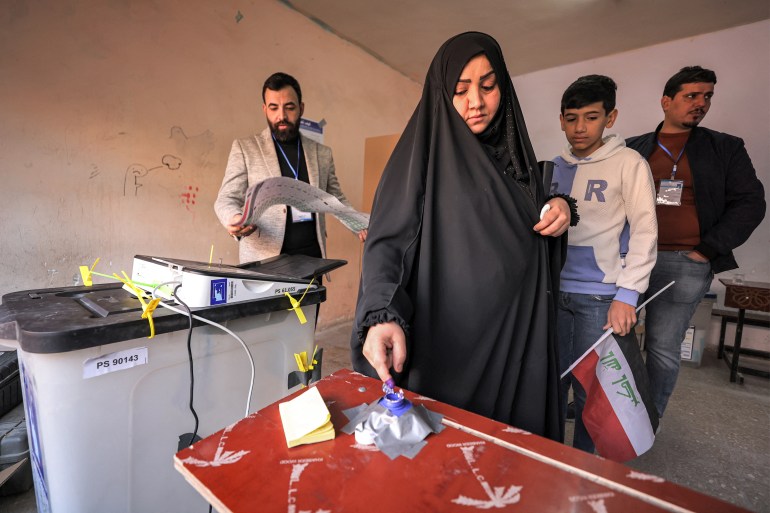The Iran-aligned coalition wins 101 out of 285 seats, and is boosted in advance of parliamentary elections in 2025.
Iraq’s governing Shia alliance has reportedly emerged as the biggest winner in the country’s provincial elections.
The loose coalition of Shia groups, called the Shia Coalition Framework (CF), took 101 of 285 council seats in the December 18 vote, Iraqi state media reports. The election result is seen as a boon to the Iran-aligned groups, which have been steadily gaining influence, in advance of a parliamentary election scheduled for 2025.
CF already forms the biggest bloc in Iraq’s parliament. The grouping ran three lists in the provincial election, but said they would govern together after the vote, the first such agreement in a decade.
The victory will strengthen the CF’s influence over Iraq’s powerful provincial councils, which are responsible for appointing regional governors and allocating health, transport and education budgets.
Who is part of the alliance?
The Shia alliance’s top list, which won 43 seats, brings together several of Iraq’s most influential Iran-allied military-political groups, including the Badr Organisation and Asaib Ahl al-Haq.
The second list, which took 35 seats, is headed by former Prime Minister Nouri al-Maliki.
The third, winning 23 seats, includes moderate Shia leader Ammar al-Hakim and former Prime Minister Haidar al-Abadi.
Together, the allied lists will control 101 seats in the provincial assemblies, more than any other bloc.
The CF’s electoral success was aided in part by a boycott from one of its main rivals, the populist Shia leader Moqtada al-Sadr.
Al-Sadr, whose party resigned from parliament in 2022 after failing to form a governing coalition, called on his supporters to stay away from the polls so as not to grant legitimacy to a “corrupt” ruling class.
Other contenders in Monday’s vote included Sunni business mogul Khamees Khanjar, whose list won 14 seats, and deposed Sunni Parliament Speaker Mohammed Halbousi, who took 22 seats, including winning the most votes in Baghdad and Anbar province.
A host of local lists and smaller groups won the remaining seats.
Despite fears of violence, the voting process unfolded largely peacefully, barring a few scattered incidents. In the al-Sadr bastion of Najaf, a stun grenade was hurled at a polling station, although it caused no injuries.
Iraq’s election commission said six million people voted in the polls, with a turnout rate of 41 percent.

From ‘trust’ to ‘service’
The results of the provincial polls, Iraq’s first in a decade, reflected the balance of power in a country where groups close to neighbouring Iran have steadily gained influence.
They are a positive sign for Iraqi Prime Minister Mohammed Shia al-Sudani, who counts on the winning CF alliance as his government’s main backer.
Following the vote count, al-Sudani urged quick action to address the country’s development challenges.
“I congratulate the political forces and successful candidates in the Provincial Council Elections,” said al-Sudani on the social media platform X.
“I hope this trust quickly transforms into tangible public service, contributing to the implementation of government plans for development, reconstruction, and service provision,” he said.









